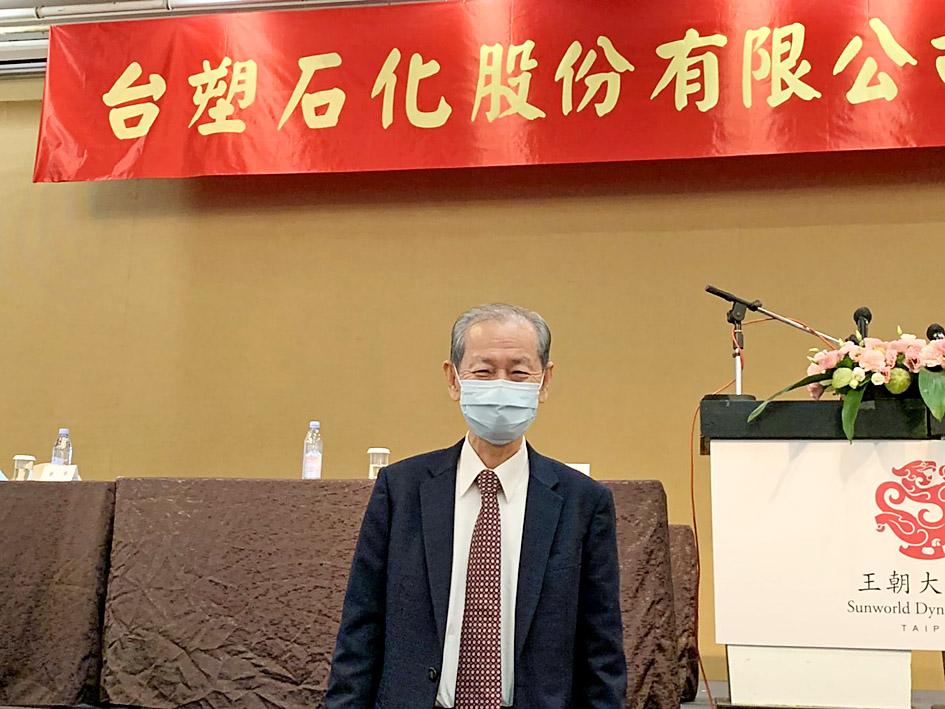A tanker seen at a refinery in Mailiao Harbor, Yunlin County, belonging to Formosa Petrochemical Corp (台塑石化) was delivering crude oil bought from Russia, the company said on Thursday.
As Western nations have stepped up sanctions on Russia over its invasion of Ukraine, local environmental groups have been calling for Formosa Petrochemical, one of the nation’s major oil refiners, to boycott Russian oil to avoid providing Moscow with any economic assistance.
In a post on social media on Wednesday, Air Clean Taiwan, an environmental protection organization, said the tanker NS Point transported up to 40,000 tonnes of oil that Formosa Petrochemical bought from Russia and had arrived in Mailiao harbor that night.

Photo: Chang Hui-wen, Taipei Times
The group called on the company not to unload the oil purchase.
Formosa Petrochemical spokesperson Lin Keh-yen (林克彥) on Thursday said that the tanker was transporting oil it bought from Russia, and that the company had to proceed with the purchase or risk breaching the contract it signed with a Singaporean company.
As the transaction was conducted under a commercial contract with the Singaporean company, unilaterally breaching the contract would result in heavy losses for Formosa Petrochemical, Lin said.
Given that Taiwan has not banned imports of Russian oil, the Singaporean company would be entitled to sue for compensation for its losses had the purchase been canceled for any reason other than force majeure — unforeseeable extraordinary events — he said.
Lin did not comment on the amount of oil on board the tanker, which departed on Thursday night after the shipment was unloaded.
Lin’s remarks are at odds with a statement by Formosa Petrochemical chairman Chen Bao-lang (陳寶郎), who in February said that the company had never imported crude oil from Russia.
Air Clean Taiwan and other groups urged people to wear yellow and blue outfits, the colors of the Ukrainian flag, and join a protest outside the company’s Mailiao refinery yesterday morning.

Popular vape brands such as Geek Bar might get more expensive in the US — if you can find them at all. Shipments of vapes from China to the US ground to a near halt last month from a year ago, official data showed, hit by US President Donald Trump’s tariffs and a crackdown on unauthorized e-cigarettes in the world’s biggest market for smoking alternatives. That includes Geek Bar, a brand of flavored vapes that is not authorized to sell in the US, but which had been widely available due to porous import controls. One retailer, who asked not to be named, because

Real estate agent and property developer JSL Construction & Development Co (愛山林) led the average compensation rankings among companies listed on the Taiwan Stock Exchange (TWSE) last year, while contract chipmaker Taiwan Semiconductor Manufacturing Co (TSMC, 台積電) finished 14th. JSL Construction paid its employees total average compensation of NT$4.78 million (US$159,701), down 13.5 percent from a year earlier, but still ahead of the most profitable listed tech giants, including TSMC, TWSE data showed. Last year, the average compensation (which includes salary, overtime, bonuses and allowances) paid by TSMC rose 21.6 percent to reach about NT$3.33 million, lifting its ranking by 10 notches

CHIP DUTIES: TSMC said it voiced its concerns to Washington about tariffs, telling the US commerce department that it wants ‘fair treatment’ to protect its competitiveness Taiwan Semiconductor Manufacturing Co (TSMC, 台積電) yesterday reiterated robust business prospects for this year as strong artificial intelligence (AI) chip demand from Nvidia Corp and other customers would absorb the impacts of US tariffs. “The impact of tariffs would be indirect, as the custom tax is the importers’ responsibility, not the exporters,” TSMC chairman and chief executive officer C.C. Wei (魏哲家) said at the chipmaker’s annual shareholders’ meeting in Hsinchu City. TSMC’s business could be affected if people become reluctant to buy electronics due to inflated prices, Wei said. In addition, the chipmaker has voiced its concern to the US Department of Commerce

STILL LOADED: Last year’s richest person, Quanta Computer Inc chairman Barry Lam, dropped to second place despite an 8 percent increase in his wealth to US$12.6 billion Staff writer, with CNA Daniel Tsai (蔡明忠) and Richard Tsai (蔡明興), the brothers who run Fubon Group (富邦集團), topped the Forbes list of Taiwan’s 50 richest people this year, released on Wednesday in New York. The magazine said that a stronger New Taiwan dollar pushed the combined wealth of Taiwan’s 50 richest people up 13 percent, from US$174 billion to US$197 billion, with 36 of the people on the list seeing their wealth increase. That came as Taiwan’s economy grew 4.6 percent last year, its fastest pace in three years, driven by the strong performance of the semiconductor industry, the magazine said. The Tsai